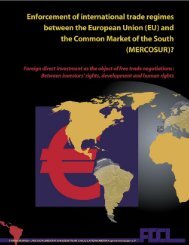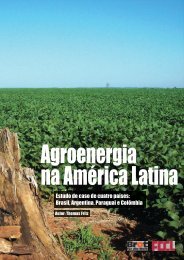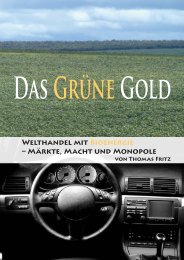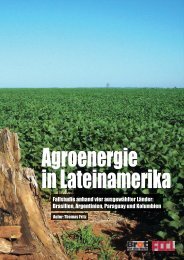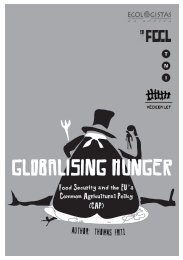(EU) and the Common Market of the South (MERCOSUR)? - FDCL
(EU) and the Common Market of the South (MERCOSUR)? - FDCL
(EU) and the Common Market of the South (MERCOSUR)? - FDCL
Create successful ePaper yourself
Turn your PDF publications into a flip-book with our unique Google optimized e-Paper software.
companies in <strong>the</strong> Caribbean tax havens. 164 ”<br />
The positioning <strong>of</strong> European corporations in <strong>the</strong> Latin American domestic markets<br />
by means <strong>of</strong> direct investment also has to be seen in <strong>the</strong> context <strong>of</strong> geostrategical<br />
economic competition with <strong>the</strong> U.S.A. And this competition in <strong>the</strong> course <strong>of</strong><br />
2003 has significantly approached <strong>the</strong> barrier <strong>of</strong> tariff –wars, which is not only being<br />
led in a disguised way anymore: The falling value <strong>of</strong> <strong>the</strong> US-dollar combined with <strong>the</strong><br />
simultaneous rise <strong>of</strong> <strong>the</strong> Euro deteriorates <strong>the</strong> foreign trade position <strong>of</strong> Europe ins<strong>of</strong>ar<br />
as European exports become more expensive <strong>and</strong> US-American exports become<br />
cheaper. As <strong>the</strong> Euro continued to rise throughout 2003, four crucial events occurred<br />
in terms <strong>of</strong> foreign trade:<br />
• First <strong>of</strong> all <strong>the</strong> WTO, within <strong>the</strong> framework <strong>of</strong> <strong>the</strong> long-lasting dispute between<br />
<strong>the</strong> <strong>EU</strong> <strong>and</strong> <strong>the</strong> U.S.A. on <strong>the</strong> U.S. practice to indirectly subsidize <strong>the</strong> exports <strong>of</strong><br />
US-companies by means <strong>of</strong> so-called “Foreign Sales Companies” (FSC), granted<br />
<strong>the</strong> <strong>EU</strong> <strong>the</strong> right to place trade related sanctions like import tariffs on US-American<br />
commodities for up to four billion US-dollars, which constitutes <strong>the</strong> highest<br />
ever trade –sanction. 165 The products affected by this measure do not have to be<br />
equivalent products. The <strong>EU</strong>, in <strong>the</strong> framework <strong>of</strong> cross-retaliation, can also place<br />
tariffs on o<strong>the</strong>r products. 166 The <strong>EU</strong> initially did not make use <strong>of</strong> <strong>the</strong> sanctions,<br />
allegedly not wanting to damage <strong>the</strong> multilateral negotiation process within <strong>the</strong><br />
WTO, until<br />
• Secondly, <strong>the</strong> fifth ministerial conference <strong>of</strong> <strong>the</strong> WTO in Cancún, México, “failed”<br />
in September <strong>of</strong> 2003 <strong>and</strong><br />
164 Own translation <strong>of</strong> <strong>the</strong> following original text: “Es fällt auf, dass nach Angaben der Zentralbanken und<br />
Fachministerien Lateinamerikas ein Fünftel der ausländischen Direktinvestitionen aus <strong>and</strong>eren Ländern, d.h.<br />
hauptsächlich aus Steueroasen, kam. Die Steueroasen scheinen aber lediglich Durchgangsstationen für die<br />
Investitionen der Unternehmen der Industrieländer zu sein. Denn die Statistiken der Industrieländer nennen ähnlich<br />
hohe Beträge für die Direktinvestitionen ihrer Unternehmen in den Steueroasen der Karibik.” Taken from: Rösler,<br />
Peter: Ausl<strong>and</strong>sinvestitionen in Lateinamerika, Ibero-Amerika verein, July 30, 2003.<br />
165 http://europa.eu.int/comm/trade/issues/respectrules/dispute/pr051103_de.htm.<br />
166 “Cross retaliation” in this context is a circumstance, which has a side-effect for <strong>the</strong> “old Europe” governments which<br />
is not undesired: The creation <strong>of</strong> brawl <strong>and</strong> displeasure between <strong>the</strong> different US- American export sectors, when,<br />
e.g., citrus farmers have income losses due to <strong>the</strong> punitive tariffs imposed on <strong>the</strong>ir product in Europe because o<strong>the</strong>r<br />
U.S. export firms infringe <strong>the</strong> WTO norms through <strong>the</strong> preferential tax treatment granted by <strong>the</strong> U.S. government<br />
– <strong>and</strong> <strong>the</strong> citrus farmers lastly have to pay for this – a circumstance which is not negligible in <strong>the</strong> 2004 U.S. election<br />
year: “Nach Angaben aus <strong>EU</strong>-Kreisen wurden Warengruppen ausgewählt, die den “maximalen politischen Effekt<br />
haben”. Orangensaft kam beispielsweise deshalb auf die Liste, weil davon US-Staaten wie Florida direkt betr<strong>of</strong>fen<br />
sind, in denen die Präsidentenwahl entschieden wird.” Carsten Matthäus: Bushs riskantes Spiel mit Stahl und<br />
Büstenhaltern, in: Spiegel Online, http://www.spiegel.de/wirtschaft/0,1518,275552,00.html. Own translation:<br />
“According to <strong>EU</strong>-information groups <strong>of</strong> goods were chosen, which have <strong>the</strong> “maximum political effect.” Orange<br />
juice, e.g., was included in <strong>the</strong> list, because states like Florida, which are crucial for <strong>the</strong> outcome <strong>of</strong> presidential<br />
elections, are directly affected.”<br />
65



